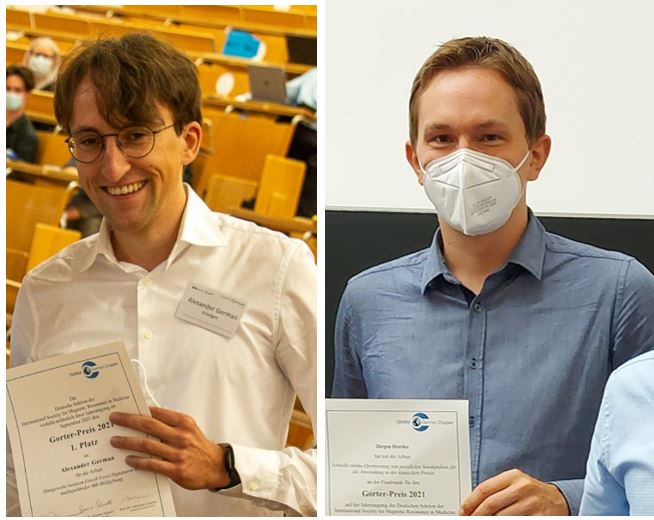The Gorter Award goes to FAU!
The Gorter Award for the best work in the field of magnetic resonance imaging goes to FAU!
Since 2005, the German Section of the ISMRM awards a prize for the best work in the field of magnetic resonance to a young scientist from medicine or a natural science at its annual meeting.
The prize was named after Cornelis Jacobus Gorter (1907-1980), a Dutch physicist who almost discovered the nuclear magnetic resonance effect in solid state. If he had taken a simple drop of water as a sample instead of lithium-7 in LiCl crystals, he probably would have won the Nobel Prize.
The first Gorter Award 2021 was awarded to Alexander German, a medical student at FAU from the research group Laun, who also thought – why difficult when it can be simple? In his work entitled “Brain tissues have single-voxel signatures in multi-spectral MRI”, he was able to show that brain regions are not only distinguishable on the basis of their specific spatial structures, but that such a classification can be applied even to single pixels. Alexander German showed that the ultra-high field MR signature of each pixel is sufficient for this purpose. The measurement of this ultra-high field MR signature was based on the application of new MR methods developed in the MR physics research groups Laun, Nagel and Zaiss of the Department of Radiology (Prof. Michael Uder) and the Department of Neuroradiology (Prof. Arnd Dörfler) and brought to application in close cooperation with clinical research groups of the hospital, such as molecular neurology (Prof. Jürgen Winkler). These findings expand the field of tissue segmentation in radiology and are of particular interest to detect diseases on a pixel-by-pixel basis when their structural alteration is small or very patient-specific. DOI: 10.1016/j.neuroimage.2021.117986
Another finalists was FAU student Jürgen Herrler from the research group Nagel with the paper: “Fast online-customized (FOCUS) parallel transmission pulses: A combination of universal pulses and individual optimization”.
Jürgen Herrler is working on the development of 7 Tesla MRI. At this high field strength, much more detailed and contrast-rich images of the human body can be acquired than at the commonly used field strengths of 1.5 Tesla or 3 Tesla. Nevertheless, a number of technical challenges have to be overcome. In particular, inhomogeneous excitations of the magnetization, which lead to inhomogeneously appearing images, are a major problem (Fig. 2 left, especially in the cerebellum). Jürgen Herrler developed a new technique using a large number of transmitting coils in parallel to achieve homogenization (Fig. 2 right). Due to their efficiency, the techniques he developed allow for the first time their application in routine clinical practice and optimize MRI signal excitation individually for each patient. DOI: https://doi.org/10.1002/mrm.28643
In addition, Christoph Stuprich, a physics student from the research group Laun, was awarded the presentation prize in Zurich for a contribution resulting from his master’s thesis. The presentation prize was awarded by an audience vote. Christoph Stuprich is working on diffusion-weighted MRI. Here, water diffusion in tissue is measured in a location-dependent manner and conclusions can be drawn about diffusion-restricting tissue structures such as cell membranes. He was able to show for the first time in simulations that signal peaks (mathematically similar to the Bragg peaks from X-ray crystallography) can be generated with diffusion weightings usable on clinical tomographs, which make the distance between cells inferable.
Fig. 1:First Gorter Prize winner Alexander German predicts wide-ranging information in brain regions purely by their pixel-wise MR signature. This is achieved without using location information, with unprecedented accuracy. From 10.1016/j.neuroimage.2021.117986

Fig. 2: Jürgen Herrler develops 7 Tesla methods that compensate for image inhomogeneities (left image without, right image with his method). From https://doi.org/10.1002/mrm.28643.
Award winner Alexander German and finalist Jürgen Herrler


